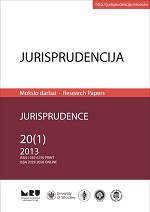Neteisėtas praturtėjimas kaip nusikalstama veika: ištakos, kriminalizavimo problema, taikymas, perspektyvos
Illicit Enrichment as a Crime According to the Criminal Law of Lithuania: Origins, Problems of Criminalization, Implementation and Perspectives
Author(s): Laurynas PakštaitisSubject(s): Law, Constitution, Jurisprudence
Published by: Mykolas Romeris University
Keywords: illicit enrichment; illicit enrichment in Lithuania; criminal responsibility; Criminal Law of Lithuania
Summary/Abstract: Recent developments in criminal legislation of the Republic of Lithuania among other significant novelties include the criminalization of illicit enrichment as criminal offence. Such offence presents new legal instrument for the law enforcement in dealing with individuals who acquire property in doubtful ways. The crime of illicit enrichment is rather a novelty within the context of criminal legislation. Such novelty was largely based upon the requirements of United Nations Convention against Corruption, which stipulates the implementation of such legal measure. According to the article Twenty of the convention, “Subject to its constitution and the fundamental principles of its legal system, each State Party shall consider adopting such legislative and other measures as may be necessary to establish as a criminal offence, when committed intentionally, illicit enrichment, that is, a significant increase in the assets of a public official that he or she cannot reasonably explain in relation to his or her lawful income”. While the convention was undoubtedly major factor for making grounds for said developments the need to widen the scope of confiscation of property and impound illegally acquired wealth were the driving forces behind the political will to support amendments to the Criminal Code. At same time the new offence of illicit enrichment presents significant challenges for the investigative bodies with the prosecution as well as the courts establishing such offences. First and foremost, the techniques of criminalization and legal wording of the offence are new and do not go well with the established principles of criminalization. Unnatural features of the corpus of the crime listed in the code (article No. 1891 of the Criminal Code of Lithuania) involve criminal act lacking attributes illegitimacy, complications regarding guilt of the accused. In addition, doubts and questions regarding the fundamental principles of criminal procedure, due process concerns, and problems of the balance of the rights of the accused with the right of the society to recover illicitly acquired wealth. The relationship of illicit enrichment to other criminal acts committed by the same accused is also of a great importance in establishing sources of such enrichment. As for the time of submission of present article, one hundred and seven interrogations on the illicit enrichment were on and lasting while only three simplified judgments and one proper court sentence were passed. The reasons for such slow implementation of the law are the ambiguities of the definition of law, as well as limitations of regulations, insufficiencies in asset declaration systems, lack of theoretical background and complete absence of court practice on such cases. Two of the existing convictions are analyzed from the point of view of establishment of guilt, the evidence set in the case, the grounds of adequacy of such convictions. The examples presented give basis to judge the adequacy of
Journal: Jurisprudencija
- Issue Year: 20/2013
- Issue No: 1
- Page Range: 319-341
- Page Count: 23
- Language: Lithuanian

